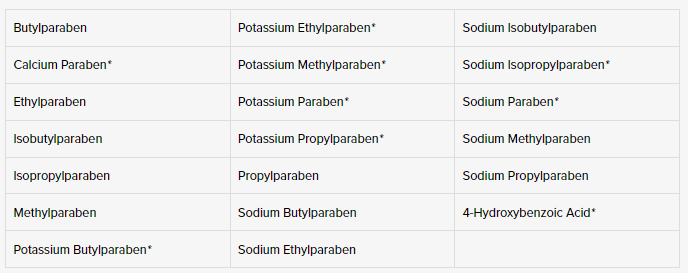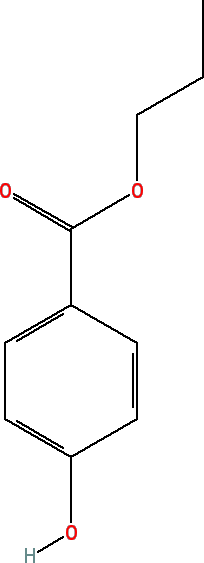Paraben
Safety Information
CIR
The safety of various parabens has been reviewed by the Cosmetic Ingredient Review (CIR) Expert Panel in 1984, 1986, 1995 and 2008 and found to be safe for use. In 2019, the Expert Panel again reviewed parabens, to include several previously unreviewed paraben salts and 4-hydroxybenzoic acid. The Expert Panel thoroughly reviewed all available scientific data and concluded the following 20 Paraben ingredients are safe in cosmetics in their present use and concentration:

*Not reported to be in current use. Were ingredients in this group not in current use to be used in the future, the expectation is that it would be used in product categories and at concentrations comparable to others in this group.
However, the Expert Panel concluded data was insufficient to determine the safety of benzylparaben (which was not reported currently in use.)
FDA
The FDA considers methylparaben and propylparaben to be Generally Recognized As Safe (GRAS) as antimicrobial agents in food [21CFR184.1490</a>; 21CFR184.1670].
Butylparaben, ethylparaben, and propylparaben are approved for use in food for humans as synthetic flavoring substances and adjuvants. [21CFR172.515] Ethylparaben may be used as an indirect food additive as a component of adhesives and coatings. [21CFR175.105]
In pharmaceutical drugs, methylparaben, ethylparaben, propylparaben, and butylparaben have been approved as inactive ingredients (excipients).
An FDA ingredient webpage titled, “Parabens in Cosmetics” concludes: “At this time, we do not have information showing that parabens as they are used in cosmetics have an effect on human health.”
According to the general provisions of the Cosmetics Regulation of the European Union, the following paraben ingredients are allowed to be used as cosmetic preservatives at concentrations up to 0.4 percent (as acid) for single esters or 0.8 percent (as acid) for mixtures of esters (Annex V, entry 12): 4-hydroxybenzoic acid, methylparaben, potassium ethylparaben, potassium paraben, sodium methylparaben, sodium ethylparaben, ethylparaben, sodium paraben, potassium methylparaben, and alcium paraben. Propylparaben and butylparaben have maximum concentration limits of 0.19 percent (single esters and their salts).
Isobutylparaben and its salts, isopropylparaben and its salts, phenylparaben, benzylparaben, and pentylparaben are prohibited from use in cosmetics products in the EU (Annex II).
